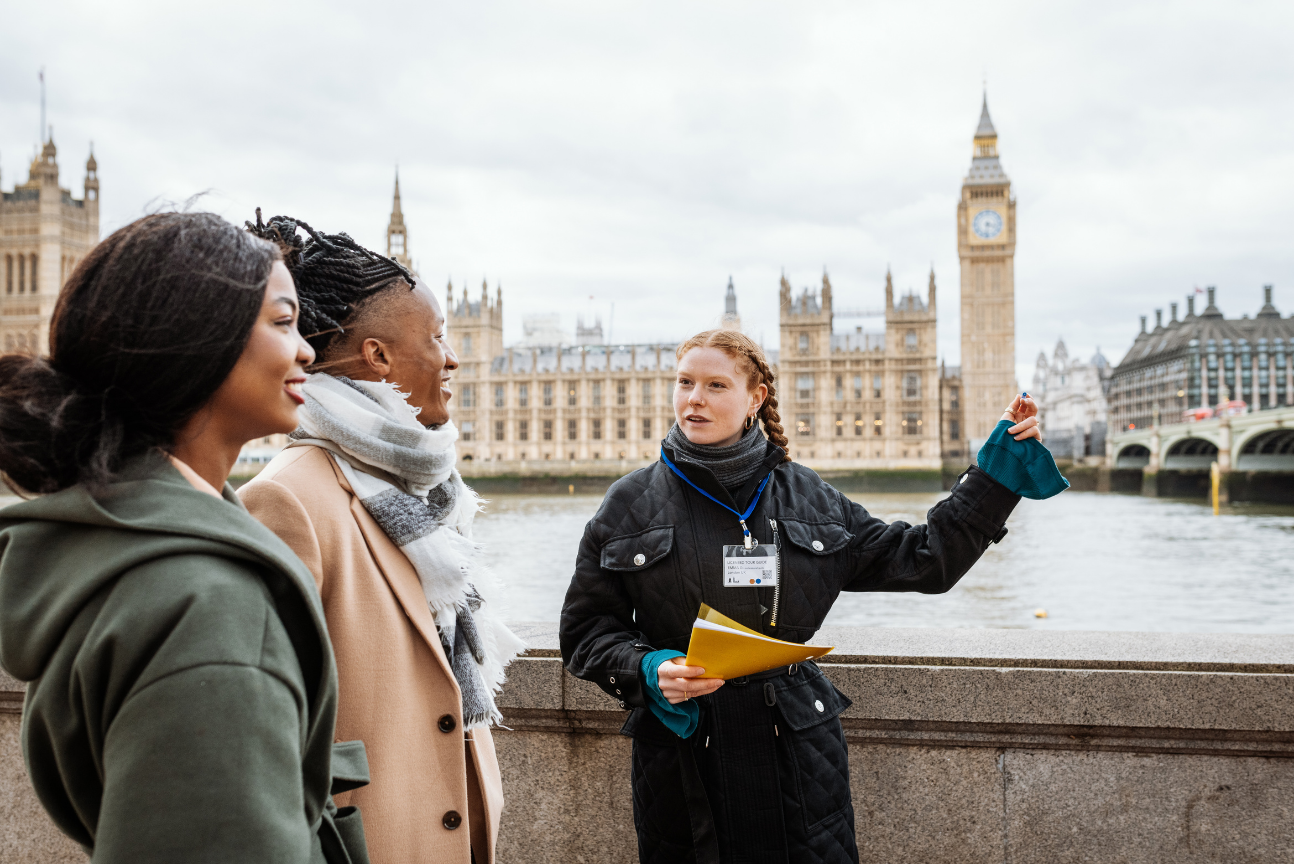Did you know the tour guide industry is expected to grow 8% by 2030?
Tour guiding blends travel and work, letting you explore new places while earning. As a guide, you’ll share your love for adventure, culture, and history, creating unforgettable experiences.
If you love travel and storytelling, this guide is for you. It explains how to become a tour guide, covering the key skills, training, and certifications you’ll need.
From city tours to safaris, this guide breaks down the steps to launch your career. Learn how to research, get educated, and gain hands-on experience. This article is a helpful and fun read for anyone looking to turn their passion for travel into a flexible, rewarding job.
But before we move on to the guide, let’s clarify the basic aspects from the sections below.
What is a Tour Guide?
A tour guide is someone who guides, educates, and entertains tourists while they explore new places. As a guide, your role is to share insights about the destination’s history, culture, and attractions.
You don’t just lead groups; you create memorable journeys by narrating the stories behind the sights.
If you are a cultural tour guide, you’ll lead visitors through historical landmarks, museums, and cultural sites. Your job will be offering a deeper understanding of the region’s traditions.
Again, adventure tour guides take thrill-seekers on exciting trips like hiking, rafting, or rock climbing, ensuring both fun and safety.
On the other hand, wildlife tour guides introduce tourists to the natural world, from safaris to bird-watching. It’s perfect for tourists who appreciate and respect nature.
Evidently, each type of tour guide specializes in different areas. It makes the profession diverse and offers plenty of opportunities to follow your passion.
If you're considering leading group tours, it's essential to understand the dynamics of organizing and managing travel tour groups. Learn more in this comprehensive guide on travel tour groups to enhance your skills and deliver memorable experiences.
Key Skills Required to Become a Tour Guide
As much as there are differences between each type of tour guide, the basic skills are the same. Here are the most important skills you should master to become a tour guide:
- Communication: Share engaging information and keep tourists interested.
- Leadership: Manage groups and ensure everyone’s safety.
- Organization: Plan schedules and handle logistics for smooth trips.
- Time Management: Stick to itineraries without making guests feel rushed.
- Problem-Solving: Handle unexpected challenges with quick thinking.
- Knowledge: Provide accurate insights about the destination.
- Customer Service: Keep guests happy and ensure a positive experience.
- Adaptability: Adjust to changing guest needs and conditions easily.
Now, comes the big question. Are you meant to be a tour guide? Let’s find out in the next section!
Is Being a Tour Guide the Right Career for You?
Being a tour guide is the perfect career for you if you have an adventurous spirit.
Let’s say you love exploring new places and have great communication skills. You're passionate about history or culture. You can captivate anyone with your storytelling, and you're a pro at time management.
Yes, you have a higher chance of becoming a travel guide!
Again, to be 100% sure if this career suits you, ask yourself the following questions:
- Do you enjoy working with people from diverse backgrounds?
- Are you comfortable with public speaking?
- Can you handle unexpected challenges and remain calm under pressure?
- Are you passionate about travel and exploring new places?
If you answered yes to most of these, being a tour guide might be the right path for you!
Step-by-Step Guide on How to Become a Tour Guide
When you’re sure about your career choice, it’s time you take a step forward. Check out the following steps on how to become a certified tour guide:
Research the Role
To become a tourist guide, start by researching the role to fully understand the job. Look into the daily responsibilities of a guide, such as planning routes, sharing historical or cultural facts, and ensuring group safety.
Explore various work environments from urban walking tours to outdoor adventure trips.
For reliable information, you should check professional resources like the National Tour Association (NTA) or blogs by experienced tour guides. These sources offer firsthand advice and industry insights.
Get Relevant Education or Training
The next step is to enroll in tour guide certification programs or pursue a travel and tourism degree. These programs teach you essential skills like group management and destination knowledge.
If you're interested in international tours, language courses can be a valuable asset. Additionally, completing first-aid training ensures you're prepared for emergencies.
Develop Essential Skills
To sharpen your skills as a tour guide, consider joining public speaking clubs like to boost your confidence and communication abilities. You can also attend leadership workshops to learn how to manage groups effectively.
Practice engaging with people by refining your storytelling techniques, making your tours more memorable. Additionally, enroll in customer service courses to enhance your guest interaction skills.
Gain Experience
Practical knowledge will be the biggest asset for you. To gain practical experience, volunteer as a local tour guide in your community.
You can also apply for internships with tour companies to get hands-on industry knowledge. Working part-time in a museum or cultural center can help you develop storytelling and customer service skills.
Obtain Necessary Licenses and Certifications
Now, you’ll need licenses and certifications depending on the location and type of tour.
For example, as a city tour guide, you’ll need a local license. On the other hand, if you go for adventure tours, you’ll require additional certifications like wilderness safety.
So, start by researching local licensing requirements to understand what's needed in your area. You’ll typically need to submit applications to relevant authorities and pass the required exams that test your knowledge of the area.
Completing a first-aid certification is also important, especially for outdoor or adventure guides. These credentials ensure you're prepared and qualified for the role.
Finding Job Opportunities or Starting Your Own Business
When you're all set with credentials and the required skillset, it’s time you start networking. Connecting with industry professionals will allow you to find jobs quickly. Online events or groups like LinkedIn and job platforms (e.g., Indeed) work best in this case.
If you’re considering starting your own tour guide business, begin by conducting market research. Create a detailed business plan outlining your services, pricing, and marketing strategy.
Try to use practical tips for finding new tour guides to grow your business and deliver exceptional tours.
Note that you have to register your business legally and obtain the necessary insurance. This sets a strong foundation for your venture.
How Much Can a Tour Guide Make?
Tour guide earnings can vary significantly based on location, specialization, and experience.
According to Salary.com, tour guides typically earn between $58,557 and $76,635 annually in the US. Individual contractors usually charge around $22.63 per hour.
Guides working in popular tourist destinations or specializing in high-demand niches like adventure or luxury tours can command higher rates. Additionally, tips from satisfied tourists can boost your income.
Physical and Emotional Challenges
While everything’s fantastic about being a tour guide, you should be aware of some precautions. A tourist guide has to go through several physical and emotional challenges.
You might feel strains on your feet for long hours, extensive walking, or crossing uneven terrain. You may also deal with extreme weather conditions, such as intense heat or rain, and might need to carry heavy equipment like microphones or backpacks.
Emotionally, guiding can be demanding. You’ll need to manage difficult tourists who may be unhappy or uncooperative, all while maintaining your enthusiasm and energy throughout the tour.
Remember balancing these challenges takes patience and emotional resilience. Strong problem-solving skills are key to ensuring a positive experience for everyone.
Key Takeaways
- Research the role to understand responsibilities, work environments, and career paths.
- Get the right training and certifications, such as tour guide programs or first-aid certification.
- Develop essential skills like communication, leadership, and customer service.
- Gain experience through internships, volunteering, or part-time jobs to build your resume and credibility.
Frequently Asked Questions
Is it Hard to Be a Tour Guide?
Yes, is hard to be a tour guide. It’s challenging especially due to long hours and managing diverse groups. You must stay enthusiastic, even with difficult tourists or in bad weather. However, if you love meeting people and sharing knowledge, it can be an enjoyable and rewarding job.
Can Tour Guides Work Freelance?
Yes, tour guides can work freelance. Many guides choose to offer independent tours, which gives them more flexibility. Freelancing allows you to create personalized tours, set your schedule, and cater to specific interests. You’ll need strong marketing skills to attract clients.
Do Tour Guides Travel for Free?
Yes, tour guides often travel for free when leading a tour group. Many companies cover travel, lodging, and sometimes meals as part of their job. However, free travel is usually limited to when you're actively working, not for personal vacations or outside of your guiding duties.











